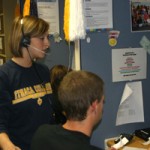A job doesn’t have to feel like just a job — something senior Amy Tuczynski said she discovered when she began working for the Ithaca Phonathon nearly two years ago.

“Phonathon isn’t something I think of as a job,” she said. “It’s more something I enjoy coming to.”
The Ithaca Phonathon was established to keep alumni connected to campus and generate donations for the college. Student phoners call more than 25,000 Ithaca parents and alumni from the 1930s to the most recent graduates.
Alyssa Robinson, assistant director of the Ithaca Fund, has been managing the program for five years.
“Every donation to Ithaca College is a good gift and an important gift to the success of the college, regardless of its size,” she said.
Robinson said about 40 to 50 students are selected from a large pool of applicants each year.
The job requires social skills that a student possesses and also skills that are learned on the job.
After being selected for the job, the phoners must undergo 11.5 hours of training before they can ever make a call.
“The students are taught how to properly introduce themselves, update records and build that connection and rapport with the people they’re calling,” she said.
Senior Laura Badger has worked for Ithaca Fund for three semesters and is now a student supervisor. She said she has had many memorable phone calls. As a speech-language pathology major, she said sometimes she speaks with alumni in her field.
“I’ve had several internship offers and really great conversations that can go on for over an hour,” she said. “You get really connected with people. You’re always jotting down information about good graduate schools. There’s been a lot of really great advice and life lessons.”
Robinson said though not all students get internship offers, the job provides student phoners with valuable professional experience. Students are expected to be reliable, and the program has policies and procedures or other professional jobs. Supervisor and management positions offer students leadership opportunities within the program but require a full-year commitment.
Sophomore Kayla Knapp is new to the program this year but said she has already noticed the level of professionalism expected from student phoners.
“I have never seen anyone come in late, even five minutes,” she said. “Everyone’s there 10 minutes early.”
Knapp said she had a frustrating first day of calls, filled with many “nos and hang-ups.”
“My first day of calling was really frustrating,” she said. “But the repeats are really nice and they like to talk.”
Knapp, who has only worked about 12 phonathon shifts so far, said she’s already had a phone call where the caller “did the work for her.” She said the man knew why she was calling and interrupted her when she started to open a conversation.
“He was like … I send in my money into you every year, so you don’t need to call here and ask for my money. I love [Ithaca College]. Goodbye,” Knapp said.
Robinson said a list of numbers to call is generated by the computer system, and students are given a basic script but are encouraged to be natural.
“We don’t want them to speak verbatim to that script,” she said. “But there are certain things we want the students to capture throughout the call.”
Tuczynski said through having conversations with alumni and hearing their experiences, she began to develop a sense of what she might want to do after college. She said she was considering moving to Washington, D.C., after graduation but was nervous about being far from home. When she had to call a woman from the district, she said the woman offered her a place to stay.
“She didn’t even know me,” she said. “I was just talking to her on the phone, but in building that positive relationship she felt comfortable with me and wanted to be there for me.”
Badger said her interaction with alumni goes beyond just getting donations.
“It’s not only to ask for money,” she said. “It’s really about building a connection with the alumni who have shared the same experiences.”







